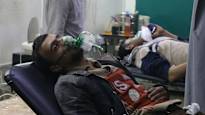In the 2010s, the United States and many Western countries made several accusations that the Syrian regime had used chemical weapons against both civilians and rebels.
According to the UN, this happened for the first time in 2013. The team of researchers who studied the chemical attacks in Syria showed According to the UN in his report that the nerve gas sarin had been used in the Ghouta area.
I hit civilians in the video below in Syria in 2013.
The material may shock:
In the 2010s, the issue was strongly opposed by the United States and Russia, which supported Bashar al-Assad administration and denied all accusations. If chemical weapons were used, according to Russia, rebel forces were responsible.
After the attacks, Syria joined the treaty banning chemical weapons out of fear of US attacks, but the accusations continued.
The news agency Reuters reports that in the spring of 2015, chemical weapons experts wanted to investigate a warehouse in Damascus that was considered suspicious.
The experts told how they had to wait for an hour outside the warehouse and when they finally got in, the warehouse was empty.
Accusations of the use of weapons of mass destruction came to the fore again in 2017.
According to the UN war crimes agency, the Syrian forces had committed the use of weapons of mass destruction more than ten times during the civil war.
One of the targets was Khan Sheikhoun, where a sarin attack killed 80 civilians. According to Russia, there was no evidence. Syria also consistently denied all accusations.
In 2018, reported on the research carried out by the British Broadcasting Company, according to which more than 100 chemical attacks had been carried out in Syria during the war.
The BBC based its assessment on 164 different reports. According to them, almost half of the attacks were carried out in the provinces of Idlib and Hama.
Chemical weapons are not only with the forces of the Syrian regime
In 2018, Syria assured that it does not possess chemical weapons, but terrorist groups such as Isis would have acquired them.
– We absolutely deny the existence of chemical weapons, including the chlorine gas that is used in them, said the Syrian Deputy Foreign Minister Faisal Mekdad.
However, the World Health Organization said 500 people were brought in for treatment in the rebel-held area suffering from symptoms caused by the toxic chemicals shortly after Syrian forces captured the area.
The investigations revealed that the Islamist terrorist organization Isis was responsible for the 2018 mustard gas attack.
The United States and its allies carried out several strikes in Syria on targets that were said to be related to chemical weapons. Israel also struck similar targets.
In April 2018, the United States, France, and Great Britain launched a hundred missiles at a research facility in Damascus that was said to be developing chemical weapons.
Syria, Russia and several Arab countries condemned the attacks.
Chemical weapons can be destroyed by bombing
Israel said it had carried out attacks on chemical weapons warehouses on the Syrian side immediately after the overthrow of the al-Assad regime. According to Israel, their purpose was to prevent chemical weapons from ending up in the possession of Islamist organizations, so that they would not threaten the country later.
Bombing chemical weapons laboratories or warehouses sounds dangerous at first. However, that is not what it is.
– When factories are bombed, where there may be chemical warfare agents, the temperature in the explosions rises so high that the warfare agents burn off. They are deliberately destroyed by burning, explains Verifin’s manager Hanna Hakulinen from the Department of Chemistry, University of Helsinki.
In 2013, the University of Helsinki was one of the first places where samples from the sarin attacks carried out in the Syrian war in the same year were analyzed.
There has been talk of sarin, chlorine and mustard gas, what exactly are chemical weapons?
– Any chemical capable of causing serious harm to health or causing death based on its toxic properties is a chemical warfare agent.
How have chemical weapons been used in Syria?
– Sarin has been a liquid in bombs that, when they explode, spread the munitions agent into the environment. Chlorine, on the other hand, has been spread in tanks that have been dropped from an airplane, says Hakulinen.
According to him, it is not known how many chemical weapons are left in Syria.
Source: Reuters
